Pennsylvania Supreme Court Election
As the federal government and federal court system become increasingly hostile to our personal freedoms and protections, state courts – particularly state supreme courts — have emerged as one of the last bastions for protecting civil and human rights. As a result, attention has been increased to these courts and their decisions, the justices that sit on state supreme courts, and the selection processes that put(s) these jurists on the bench. From decisions protecting abortion access and medical autonomy in a post-Dobbs post-Skermetti landscape, to holding the line against partisan gerrymandering following Rucho, state courts are and have been critical defenders of civil and human rights, especially while federal courts retreat from their constitutionally enshrined obligation and duty to protect and defend constitutional rights.
Judicial elections, previously under the radar and thus incurring lower financial investment and voter participation than legislative or executive elections, are now flooded with millions of dollars from outside interests. In 2024, several states had record-breaking spending in their respective judicial elections, including Michigan, Montana, North Carolina, and Oklahoma. Outside interests were heavily competing for a stake in each of these courts because of the courts’ role in challenging the federal government’s rollback of constitutional rights or rubberstamping governmental and political entities that seek to erode personal freedoms.
Earlier this year, Wisconsin shattered its own campaign spending record in its April supreme court election. Trump-aligned billionaire Elon Musk invested over $3 million, including offering the opportunity to “win” a $1 million lottery-style prize if the voter signed a pledge committing to voting in the judicial election, in the race to influence and solidify conservative control of the court. There is only one other state judicial election this year—the Pennsylvania Supreme Court’s retention elections. While the justices will appear in uncontested elections, considering Pennsylvania’s record-breaking election spending in 2023 and the high-dollar Wisconsin election, this race will likely attract attention from outside donors and advocacy groups alike. This year, conservative organizer Scott Presler is running a campaign aimed at unseating the three Democratic justices.
Judges are tasked with upholding the rule of law and ensuring that justice is served impartially, regardless of political affiliation or financial power. When wealthy investors use their financial clout to sway judicial elections, it calls into question the impartiality of those elected judges and whether they can genuinely serve the interests of all citizens. The influence of wealthy donors can lead to judicial decisions that favor the interests of the few and the wealthy over the rights and needs of those without financial means. Judges elected because of the backing of affluent investors may feel obligated to rule in ways that align with their benefactors’ interests, rather than adhering to the rule of law, established legal principles, and protecting the rights of ordinary citizens. This can result in decisions that prioritize corporate interests, undermine civil liberties, and weaken protections for vulnerable communities.
The Pennsylvania Supreme Court has issued key decisions protecting fair and equal access to the ballot, LGBTQ+ protections, civil rights, and basic workplace protections like access to sick leave and overtime pay. The coordinated effort by conservatives across the commonwealth reveals a campaign seeking to deliver more wins for corporate interests, the wealthy, and the powerful. This attack on the justices seeks to undermine the court’s ability to protect every Pennsylvania residents’ constitutional rights and freedoms.
Pennsylvania Supreme Court
Pennsylvania Supreme Court justices are elected to their initial terms in partisan elections. Justices serve 10-year terms and must win a retention election to remain on the bench thereafter. In retention elections, judges appear on the ballot without an opposing candidate. Voters choose yes or no to retain each judicial candidate. In 2025, there are three state supreme court justices up for retention election. The election is on November 4, 2025.
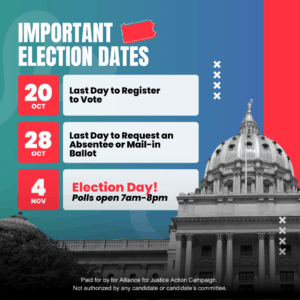
The Stakes
-
The Pennsylvania Supreme Court is the “court of last resort” in the state, meaning the court has the final say in interpreting the Pennsylvania Constitution and defining every Pennsylvanians’ constitutional freedoms as enshrined in the state constitution. For example, earlier this year, the court interpreted the state constitution such that it expanded parental rights for LGBTQ+ parents by defining a contemporary pathway to parentage: “intent-based parentage.” With the Trump administration challenging LGBTQ+ rights, state courts play a crucial role in defining protections for the community. In addition to protections for LGBTQ+ individuals and their families, the Pennsylvania Supreme Court has delivered numerous decisions that protected and expanded Pennsylvanians’ civil rights, stood up to corporations, ensured equal access to education, and more since the election of Justices Donohue, Dougherty, and Wecht.
State courts also have been a bulwark for reproductive rights, especially after the Dobbs decision from the U.S. Supreme Court. Pennsylvania is no exception. Last year, in a 3-2 decision, the court affirmed a lower court finding of the right to reproductive autonomy in the state constitution. It overturned a 42-year-old decision that banned Medicaid-funded abortions. The justices found the court’s past decision violated the state’s Equal Rights Amendment.
The court also played a key role in protecting voters’ access to the ballot. The Pennsylvania Supreme Court twice blocked gerrymandering attempts in the commonwealth, first in 2018 and later in 2022. The court also dismissed baseless claims of voter fraud in the 2020 election and prevented U.S. Rep. Mike Kelly and other Republicans from disenfranchising millions of voters. Finally, in 2022, the court upheld Act 77, a law that expanded access to mail-in voting by establishing state-wide universal mail-in voting. The law was passed shortly before the COVID-19 pandemic and critically allowed many voters to safely access the ballot without putting their health at risk.
The court also played a key role in holding corporations accountable from insurance companies to environmental polluters. These decisions sought to curb greedy and predatory insurance practices as well as strengthen environmental protections and labor rights. The court mandated that private employers provide paid sick leave to their employees by upholding a 2015 Pittsburgh ordinance. The court limited the tax exemptions for which oil and natural gas companies were eligible and mandated that the money gained must go back into the communities surrounding drill sites. In its refusal to hear an appeal against striking Pittsburgh Post-Gazette workers, the court validated the workers’ right to strike for better wages and benefits. As an additional result of that decision, the Post-Gazette had to pay the union’s legal fees.
The Candidates
-
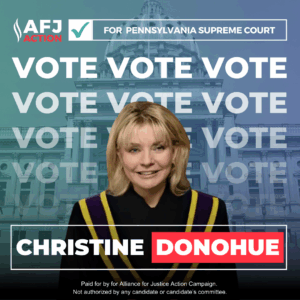
Justice Christine Donohue (D) won election to the Pennsylvania Supreme Court in 2015. Donohue previously served as a judge on the statewide superior court after winning the election in 2007. Donohue worked in private practice before serving as a judge. While in private practice, she first focused on personal injury law and then transitioned to complex appellate commercial litigation.
Since being elected in 2015, Donohue has:
- Joined the opinion establishing “intent-based parentage” for same-sex couples
- Wrote the opinion ordering a lower court to review a case challenging the Abortion Control Act, banning public or Medicaid funding for abortion services, and found that coverage exclusion violated the equal rights amendment
- In the opinion, Donohue found “the right to reproductive autonomy, like other privacy rights, is fundamental.”
- Joined the opinion and order finding the 2011 Congressional maps an illegal partisan gerrymander and mandated the supreme court’s remedial plan be implemented for the 2018 elections
- Joined the opinion implementing “the Carter Plan” for the 2022 primary and general congressional elections after Pennsylvania lost one of its congressional seats following the 2020 census
- Wrote the opinion upholding Act 22, ensuring that Pennsylvanians maintain their access to no-excuse mail-in voting
- Joined the decision mandating the Pennsylvania Commonwealth Court to hold a trial to determine the constitutionality of the commonwealth’s public education funding system
- Joined the opinion upholding the Pittsburgh Paid Sick Days Act, securing employees’ right to accrue sick leave
-
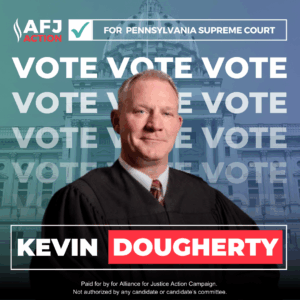
Justice Kevin Dougherty (D) won election to the Pennsylvania Supreme Court in 2015. Before joining the supreme court, Dougherty served as a judge on the Philadelphia County Court of Common Pleas, where he was administrative judge in the trial division and supervising and administrative judge in the family division. Gov. Tom Ridge (R) appointed Dougherty to the court in 2001, and a year later, Dougherty ran for election to serve a full term. Doughtery ran for retention and won once before being elected as a supreme court justice. Before his appointment, Dougherty was special master for the Philadelphia Family Court Truancy program. He began his career as an assistant district attorney and then worked in private practice, working on criminal and civil law with a focus on family law.
Since being elected in 2015, Dougherty has:
- Wrote the opinion establishing “intent-based parentage” for same-sex couples
- Wrote a concurring opinion finding the Abortion Control Act violated the Equal Rights Amendment
- Joined the opinion and order finding the 2011 Congressional maps an illegal partisan gerrymander and mandated the supreme court’s remedial plan be implemented for the 2018 elections
- Joined the opinion implementing “the Carter Plan” for the 2022 primary and general congressional elections after Pennsylvania lost one of its congressional seats following the 2020 census
- Joined the opinion upholding Act 22, ensuring that Pennsylvanians maintain their access to no-excuse mail-in voting
- Joined the decision mandating the Pennsylvania Commonwealth Court to hold a trial to determine the constitutionality of the commonwealth’s public education funding system
- Joined the opinion upholding the Pittsburgh Paid Sick Days Act, securing employees’ right to accrue sick leave
-
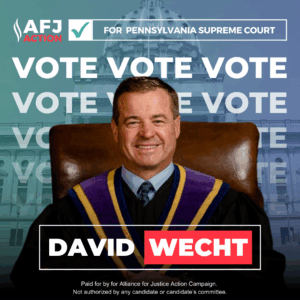
Justice David Wecht (D) won election to the Pennsylvania Supreme Court in 2015. In addition to his judicial service, Wecht teaches at Duquesne University School of Law, the University of Pittsburgh, and Harry Radzyner Law School at Reichman University. He was previously a judge on the statewide superior court. Wecht also served as judge on the Allegheny County Court of Common Pleas. Before serving as a judge, Wecht worked in private practice across many areas, but ultimately focused on personal injury litigation.
Since being elected in 2015, Wecht has:
- Joined the opinion establishing “intent-based parentage” for same-sex couples
- Joined the opinion ordering a lower court to review a case challenging the Abortion Control Act, banning public or Medicaid funding for abortion services, and found that coverage exclusion violated the equal rights amendment
- Agreed “the right to reproductive autonomy, like other privacy rights, is fundamental”
- Joined the opinion and order finding the 2011 Congressional maps an illegal partisan gerrymander and mandated the supreme court’s remedial plan be implemented for the 2018 elections
- Joined the opinion implementing “the Carter Plan” for the 2022 primary and general congressional elections after Pennsylvania lost one of its congressional seats following the 2020 census
- Joined the opinion upholding Act 22, ensuring that Pennsylvanians maintain their access to no-excuse mail-in voting
- Wrote the decision mandating the Pennsylvania Commonwealth Court to hold a trial to determine the constitutionality of the commonwealth’s public education funding system
- Wrote the opinion upholding the Pittsburgh Paid Sick Days Act securing employees’ right to accrue sick leave
Our Recommendation
-
Because of their record of upholding constitutional rights and rejecting corporate and conservative overreach, AFJ Action recommends a YES VOTE for Justice Donohue, Justice Dougherty, and Justice Wecht. The justices played key roles in decisions that protected constitutional freedoms and stood for the interests of working people, not corporations or the wealthy and powerful. State supreme courts’ responsibility to act as a check on the other branches of government will become especially important as conservative interests attempt to erode our constitutional rights and freedoms.
Retain Justice Donohue, Justice Dougherty, and Justice Wecht to continue to protect the supreme court’s integrity and ability to uphold the rule of law.
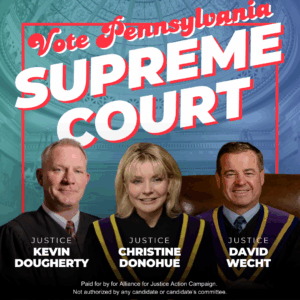
Paid for by Alliance for Justice Action Campaign, www.afjactioncampaign.org, and not authorized by any candidate or candidate’s committee.

